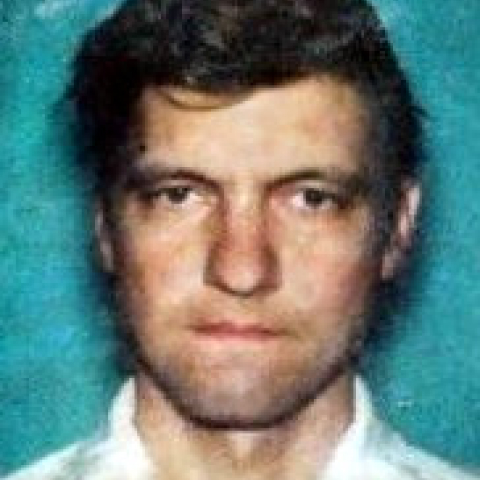Ted Kaczynski's IQ: 167

In 1962, as Ted Kaczynski entered Harvard University at just 16 years old, he was already something of a mystery. Born in Chicago, Theodore John Kaczynski (his full name) showed signs of exceptional intelligence from a young age. By fifth grade, he scored an IQ of 167 on an IQ test administered by a school counselor. While many might have expected a child prodigy with such gifts to thrive socially and academically, Kaczynski's journey would take a more complicated turn. His mind, sharp and agile, found solace in numbers and the abstract logic of mathematics, but he struggled with the day-to-day rhythms of a typical teenage life. This contrast between brilliance and isolation would mark much of his life.
Harvard was an environment designed to nurture gifted minds, but for Kaczynski, it was more of a proving ground for survival than a place to flourish. He kept to himself, retreating into his studies while most of his peers navigated the vibrant social life of the campus. Professors noted his intelligence, and he began making strides in mathematics, developing an early fascination with boundary functions. Yet, alongside his academic success, there was an underlying sense of alienation, a feeling that would deepen over the years and shape his future choices. During his time at Harvard, he participated in an ethically dubious psychological study led by Professor Henry A. Murray, which subjected participants to intense interrogation and stress. Some believe this experience, alongside his exposure to critiques of modern society, played a role in shaping the ideas that would later define his manifesto.
The toll of isolation and a life off the grid
As Kaczynski retreated to his cabin in the Montana wilderness, the once-promising academic seemed to abandon everything his intelligence had earned him. But even in his remote life, his mind never rested. Kaczynski continued to write prolifically, developing a critique of industrial society that he believed was stripping away human freedom and autonomy. His manifesto, Industrial Society and Its Future, emerged as a blend of philosophical thought and extreme discontent, reflecting a mind that had turned against the very systems he once engaged with.His growing sense of disillusionment eventually took a darker turn, leading to a campaign of terror that spanned 17 years. Kaczynski became known as the "Unabomber," a name that struck fear across the country. From his secluded cabin, he crafted meticulously designed bombs, targeting university professors, airline executives, and others he associated with technological progress. His attacks left three people dead and injured many more, setting off one of the most extensive manhunts in FBI history. The agency's efforts to track him down stretched for nearly two decades, involving thousands of hours of investigation and countless tips. This intense pursuit was later dramatized in the series Manhunt: Unabomber, which highlighted the painstaking process of deciphering Kaczynski's patterns and linguistic clues. It was only when his manifesto was published in national newspapers, leading his brother to recognize the writing style, that the FBI finally made a breakthrough.
A complex legacy of intellect and isolation
In 1996, when Kaczynski was finally arrested and evaluated, his IQ was measured again—this time at 136, a drop from his earlier score of 167. Some psychologists attributed this IQ decline to years of isolation and the onset of paranoid schizophrenia, a condition known to reduce cognitive function. Others argued that the discrepancy could reflect the limitations of IQ tests, especially when considering the circumstances under which the evaluations were conducted. After all, Kaczynski had spent years rejecting modern society and its conventions; it is not hard to imagine that he would approach any formal assessment with a degree of resistance, and his mindset would affect his IQ results.Kaczynski spent the rest of his life in prison, continuing to write until his death in 2023 at the age of 81.
Even with his decline, Kaczynski’s intellectual legacy remains a complex paradox. He was capable of intricate mathematical thought yet drawn to a life stripped of modern comforts. His writings continue to provoke discussions about the role of technology in human life, even as his violent methods are condemned. Kaczynski's life challenges us to rethink the nature of intelligence—is it merely cognitive ability, or does it also include how one chooses to use that ability? His path deviated radically from expectations, leaving a dark mark on history.
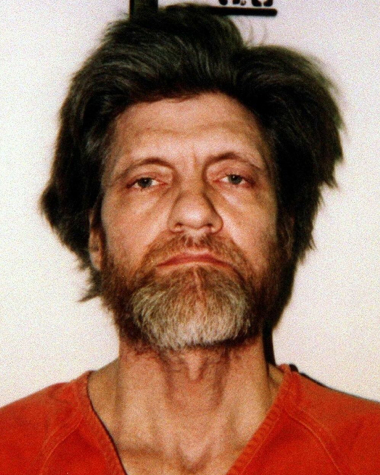

Average Confidence Level
HighTed Kaczynski's IQ was calculated by averaging the scores reported by two reputable sources: BBC and The New York Times. We also showing the score reported by three less authoritative sources for reference.
 Confidence Level: Medium
Confidence Level: Medium
 Confidence Level: High
Confidence Level: High
 Confidence Level: High
Confidence Level: High
 Confidence Level: Low
Confidence Level: Low
 Confidence Level: Medium
Confidence Level: Medium
5 Facts That Reveal the Complex Mind of Ted Kaczynski
- Harvard at Sixteen: Demonstrating his intellectual capabilities early on, Ted Kaczynski was accepted into Harvard University at the young age of sixteen. This indicates a precocious grasp of knowledge and analytical thinking that distinguished him from his peers.
- Mathematical Contributions: Kaczynski's contributions to the field of mathematics, particularly complex analysis, were noteworthy. He published several papers in well-respected journals before turning his back on an academic career. This showcases his ability to navigate and innovate within abstract mathematical concepts.
- Meticulous Planning: Kaczynski exhibited a very calculating mindset through the meticulous planning of his bombing campaign. He crafted intricate bombs and plans with precision, carefully choosing his targets to align with his anti-technology and anti-modernization ideology.
- Isolated Cabin Life: Choosing to live in a remote, self-built cabin in Montana without electricity or running water, Kaczynski's lifestyle choice reflects a calculated rejection of modern society and technology. This decision also aligned with his ideological beliefs and allowed him to evade capture for years.
- Strategic Manifesto: The publication of Kaczynski's manifesto, 'Industrial Society and Its Future', was a strategic move to spread his anti-industrialization message. By compelling major publications to print it under the threat of further violence, he ensured his philosophy reached a broad audience.

Try our accurate online IQ Test. Get your IQ score immediately.
Start IQ Test
Was The Unabomber Much Smarter Than The Average?
With an IQ of 167, Ted Kaczynski’s intellectual ability places him among the rarest minds, those whose cognitive gifts are shared by only 1 in every 250,000 people. Hypothetically, this score would exceed the thresholds for joining some of the world’s most selective high-IQ societies, such as Mensa, Intertel, and the Triple Nine Society, which admits only the top 0.1% of scorers. While Kaczynski’s criminal actions and ethical failings would prevent any actual membership, these comparisons highlight just how far above average his intelligence truly was.
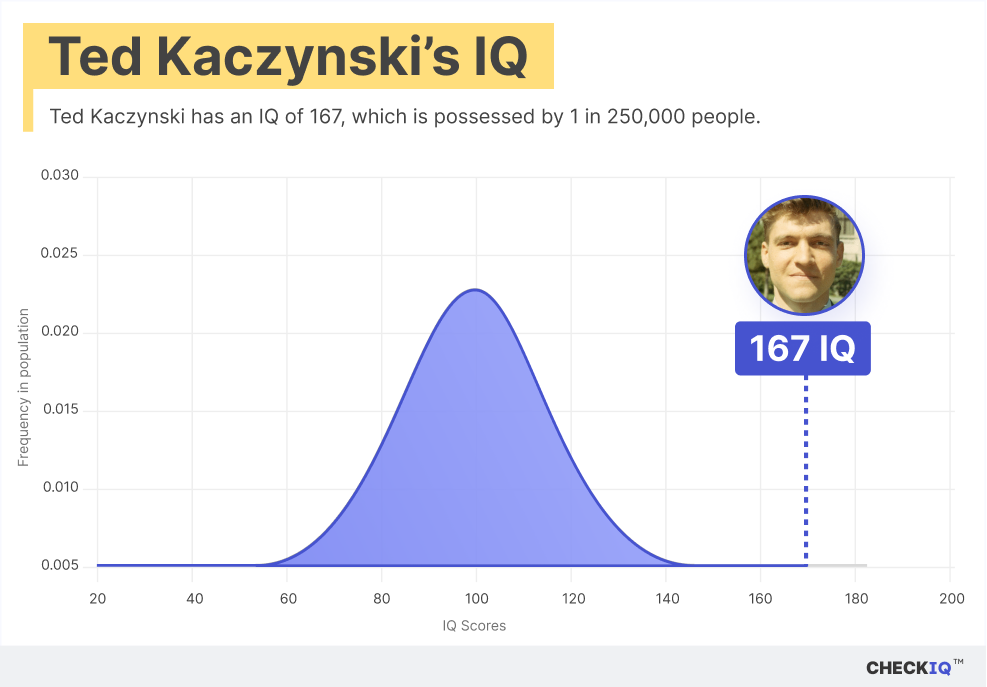
How Ted Kaczynski’s 167 IQ Compares to Other High-IQ Criminals
Ted Kaczynski's story shows that intelligence can lead to a life of anger, loneliness and crime. With an IQ of 167, he had the potential for greatness, but his choices led him down a destructive path. Sadly, he’s not alone in this.
Keith Raniere, who had a reported 240 IQ, is another example of a highly intelligent individual whose life took a dark turn. Known for leading the controversial NXIVM group, Raniere used his intelligence to manipulate and control people. His high IQ gave him the ability to create complex systems of thought and influence, turning his intellect into a tool for power and control. While Kaczynski isolated himself in a cabin, Raniere surrounded himself with followers, convincing them of his so-called higher purpose. Both men were among the smartest criminals to ever live.
Then there’s Nathan Leopold, whose IQ of 210 shocked those around him. In the 1920s, Leopold and his partner committed a terrible crime, believing their intelligence made them superior to others. Like the Unabomber, Leopold’s intelligence didn’t stop him from doing harm. But while Leopold thought he was above the law, Kaczynski’s anger was aimed at the entire system, rejecting the way society was changing.
A bit closer to Kaczynski is Charlene Gallego, with an IQ of 160. She and her husband carried out terrible crimes together. Her smarts, like Kaczynski’s, helped her plan these actions. But while Kaczynski lived alone in the Montana woods, Gallego managed to hide her dark side for years before being caught.
Then there’s Andrew Cunanan, with an IQ of 147, who used his intelligence to charm and manipulate people. His life ended in a tragic crime spree that included the murder of fashion designer Gianni Versace. While Cunanan’s IQ was lower than Kaczynski’s, both struggled with feeling like they didn’t fit in. Cunanan craved attention and luxury, while Kaczynski turned away from it all, seeking a simpler life.
At the lower end of this high-IQ list is Jeffrey Dahmer, with an IQ of 145. Like all above criminals, Dahmer’s intelligence was overshadowed by his horrific acts. He used his planning skills in deeply disturbing ways. Unlike Kaczynski, who wrote about his beliefs, Dahmer’s actions came from a place of compulsion rather than a bigger idea. But both stories show how intelligence doesn’t guarantee good choices!
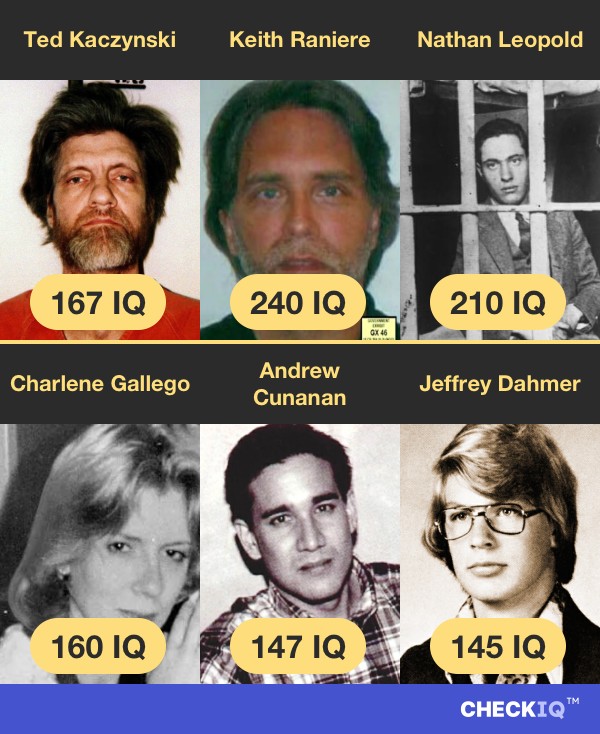
Does Ted Kaczynski's IQ of 167 surprise you? Drop your reaction in the comments section!

Explore the IQ of Other Famous People
-
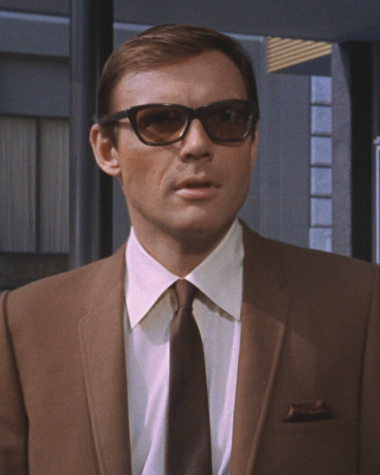 Bruce Wayne192 IQ
Bruce Wayne192 IQ -
 Madonna140 IQ
Madonna140 IQ -
 Lionel Messi191 IQ
Lionel Messi191 IQ -
 Quentin Tarantino160 IQ
Quentin Tarantino160 IQ -
 Sam Altman170 IQ
Sam Altman170 IQ -
 Kate Beckinsale152 IQ
Kate Beckinsale152 IQ

